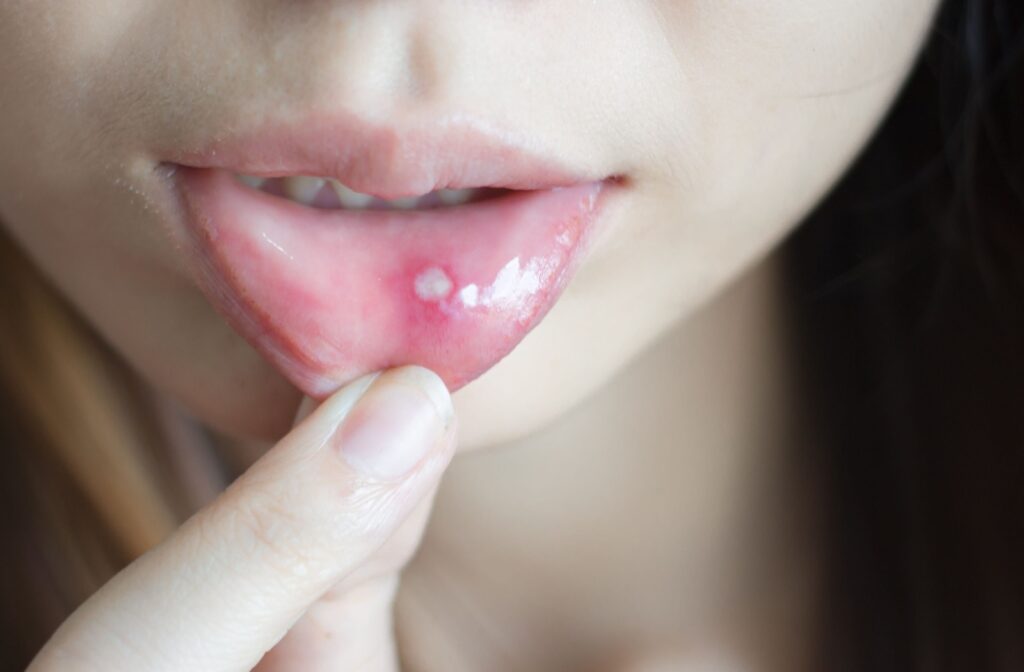Canker sores, also known as aphthous ulcers, are small, painful sores that develop inside the mouth, often on the inner cheeks, lips, tongue, or gums. They can make eating, drinking, and even talking uncomfortable. While they usually heal on their own within a week or two, there are ways to reduce pain, speed up healing, and prevent future outbreaks.
To get rid of canker sores, keep the area clean, avoid irritating foods, and use topical treatments or rinses to promote healing and relieve discomfort.
In this guide, we’ll explain what causes canker sores, how to treat them at home, when to seek professional help, and how to reduce your risk of getting them again.
What Causes Canker Sores?
The exact cause of canker sores isn’t fully understood, but several factors can trigger them:
- Minor injuries to the mouth, such as biting your cheek or irritation from dental appliances.
- Stress and fatigue, which can weaken your immune system.
- Nutrient deficiencies, particularly iron, folic acid, and vitamin B12.
- Hormonal changes, such as those that occur during menstruation.
- Food sensitivities, especially to acidic or spicy foods.
- Underlying health conditions, like celiac disease or inflammatory bowel disease.
Canker sores are not contagious, so you can’t pass them to someone else, but they can still be bothersome enough to disrupt your daily routine.
How to Get Rid of Canker Sores
Most canker sores will heal on their own within seven to fourteen days, but there are steps you can take to relieve discomfort and promote faster healing.
1. Use a Saltwater or Baking Soda Rinse
Rinsing your mouth with warm saltwater (½ teaspoon of salt in a cup of warm water) can help reduce bacteria and promote healing. Baking soda rinses can also help neutralize acids in the mouth that make canker sores last longer.
2. Apply a Topical Gel or Ointment
Over-the-counter gels or pastes containing benzocaine or hydrogen peroxide can help numb the sore and protect it from irritation.
3. Avoid Irritating Foods
Spicy, acidic, and rough-textured foods can make the pain worse. Stick to soft, bland foods until the sore heals.
4. Maintain Good Oral Hygiene
Gently brushing your teeth with a soft-bristle toothbrush and using a mild toothpaste can prevent further irritation.
5. Manage Stress & Fatigue
Since stress is a known trigger, practising relaxation techniques like meditation or deep breathing may help reduce flare-ups.

When to See a Dentist or Doctor
While most canker sores are harmless, you should seek professional care if:
- A sore lasts more than three weeks.
- You have unusually large or painful sores.
- You develop a fever alongside the sores.
- You get frequent outbreaks (more than three times a year).
- The sores spread or don’t respond to home treatments.
A dentist or doctor can check for underlying causes and may prescribe stronger treatments such as antimicrobial mouth rinses, corticosteroid ointments, or oral medications.
FAQs About Canker Sores
Are canker sores the same as cold sores?
No. Cold sores are caused by the herpes simplex virus and appear on the outside of the mouth or lips, while canker sores form inside the mouth and are not contagious.
How long do canker sores last?
Most heal within 1–2 weeks without treatment, although larger sores may take longer.
Can certain foods trigger canker sores?
Yes. Acidic foods like citrus fruits, tomatoes, and vinegar, as well as some spicy foods, can trigger or worsen sores in some people.
Can vitamin deficiencies cause canker sores?
Deficiencies in iron, folic acid, or vitamin B12 can contribute to frequent sores. A balanced diet or supplements (if recommended by your healthcare provider) may help.
Do canker sores mean I have an underlying health problem?
Not necessarily. Many cases are related to minor injuries or temporary triggers, but recurring or severe sores may be linked to other health conditions.
Preventing Future Canker Sores
While it’s not always possible to prevent canker sores completely, you can lower your risk by:
- Eating a nutrient-rich diet with plenty of fruits, vegetables, and whole grains.
- Using a soft-bristle toothbrush to avoid mouth injuries.
- Avoiding foods that have triggered sores in the past.
- Reducing stress through regular relaxation techniques.
- Staying well-hydrated to maintain overall oral health.
Professional Help for Canker Sores
Canker sores can be painful, but they’re usually short-lived and manageable with the right care. By avoiding irritants, using soothing rinses or gels, and maintaining good oral hygiene, you can speed up healing and reduce the likelihood of future outbreaks. If you have persistent, unusually painful, or recurring canker sores, it’s best to have them checked by a dental professional right away. Shin Dentistry in Stouffville, ON offers comprehensive oral care and can help identify possible triggers, provide targeted treatment, and give you practical advice to keep your mouth healthy and comfortable. Contact us today to schedule an appointment and get relief from bothersome canker sores.



